Search Images
Browse Content (p. 1617)
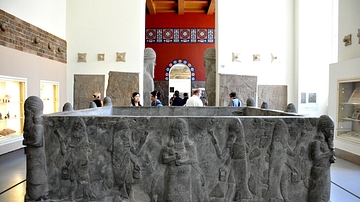
Image
Basalt basin for purification purposes from Ashur
When discovered, this water basin was completely shattered. It was cut originally from a single basalt block and was located in the courtyard of the temple of Ashur. At each corner and side of the basin's walls, there are water gods holding...
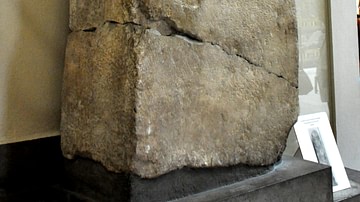
Image
Stela of Queen Sammu-Ramat
Stela of Queen Sammu-Ramat from Assur (Ashur), northern Mesopotamia, modern-day Iraq. Neo-Assyrian Empire, c. 809 BCE. The cuneiform inscriptions on the upper part of the stela say that Sammu-ramat (or Shammuramat) is the wife (and palace...
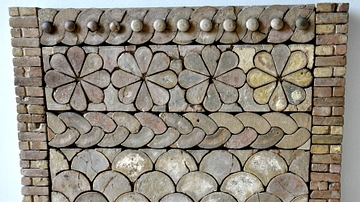
Image
Part of an altar from Tel Halaf
These enamelled bricks formed part of an altar at the forecourt of the temple palace of Guzana (or Gozan). From Tell Halaf (modern Al-Hasaka Governorate), northeastern Syria. Neo-Assyrian period, circa 800 BCE. (The Pergamon Museum, Berlin...
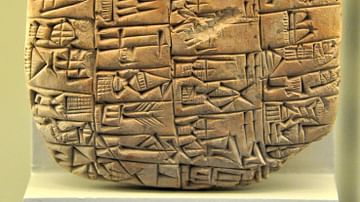
Image
Clay tablet from the Archaic Buildings of Ishtar Temple
This clay tablet lists the names of certain persons with their corresponding official designation. The Archaic buildings of the Ishtar Temple were in use from 2500-2000 BCE. From the Archaic temples (or buildings) of Ishtar at the city of...
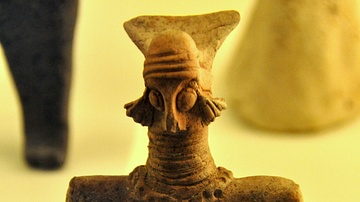
Image
Votive Statuette from the Archaic Buildings of the Ishtar Temple
Only the upper half of this small female terracotta statuette has survived. The woman wears a hat and a necklace and covers her naked breasts with her hands. The Archaic buildings of the Ishtar Temple were in use from 2500-2000 BCE. From...
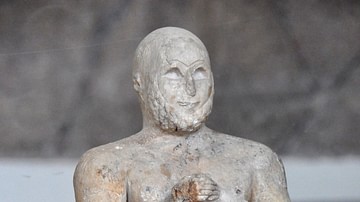
Image
Statuette of a Praying Man
Alabaster statuette (height: 46 cm), depicting a bearded bald-headed man, most likely a priest/man of a high rank. He clasps his hands in a prayer attitude. The upper part of the body is naked, while the lower half is covered by a sheepskin...
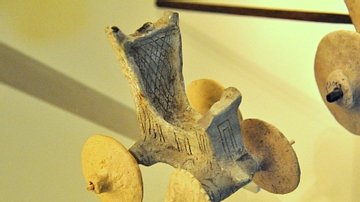
Image
Votive Toy from the Archaic Buildings of the Ishtar Temple
This small terracotta toy in the shape of a wagon was a votive donation to the goddess Ishtar. The Archaic buildings of the Ishtar temple were in use from 2500-2000 BCE. From the Archaic temples (or buildings) of Ishtar at the city of Ashur...
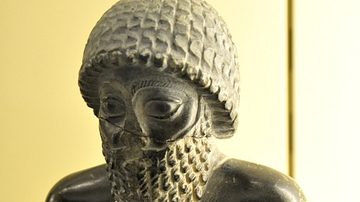
Image
Statue of Ur-ningirsu
The cuneiform inscriptions on the back of this small diorite statue (height 18 cm) read, "Dedicated to the god Ningizzida, his god, by Ur-ningirsu, priest-prince of Lagash, son of Gudea, priest-prince of Lagash." This bearded man is Ur-ningirsu...
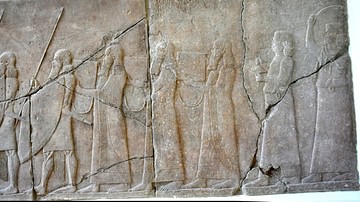
Image
Assyrian Wall Relief Depicting Musical Instruments
Alabaster bas relief depicting marching shield bearers accompanied by a group of musicians who carry different musical instruments, from Nineveh, northern Mesopotamia, Iraq, Neo-Assyrian Empire, reign of king Sennacherib, 705-681 BCE. The...
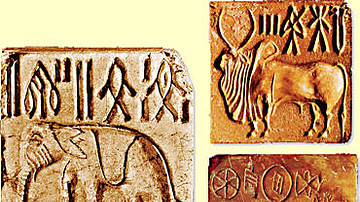
Image
Indus Valley Seals
Seals with Indus Script from Indus Valley Civilizations.